This still matters
Periodically Ouiser sends me articles from Greensboro about things she know will interest me. One of the stories I’m nearly always happy to get an update about is update about Deborah Moy. Nearly always. I was not happy to hear that the man accused of her attack was release. Also, the updates written by Brian Clarey tend to get mixed reviews from me.
In 2009, shortly after the September 2008 attack, I wrote a piece for Shakesville, posted under the title “This Stuff Matters” about the media coverage of this case, and specifically Clarey’s treatment of it. You can find details of the case there. Yes, having a piece at Shakesville, feels as good as being a PhD now, instead of a PhD in Training as I called myself. Even if re-reading it today makes me want to edit it one more time.
Clarey’s updates receive mixed reviews from me, because on the one hand, as Ousier points out, he is the only one who still covers the story. At the same time the lens and tone of his coverage is always off. Like Clarey, I was drawn to this case, and am still haunted by it, because of a personal connection. The DH had worked with Moy, and remained friends/acquaintances with her. His profound dismay when he called to tell me about the incident, coupled with my own horror as I heard about it etched this story into me. Little did the DH and I know, when we heard of the mid-September attack on Moy, that I was also just three weeks away from our own life changing event.
As I’ve written about before, on October 4, 2008 I had a stroke. I spent the next three weeks in the hospital recovering. One of the effects of the stroke was that it took me a very long time to begin to accurately remember the days and weeks leading up to the event. I could remember my 35th birthday on September 2nd, mostly because I was sick with the flu/cold I unconsciously associate with the beginning of my stroke time. I could also remember the doctor’s visits when I complained about the pain in my neck, which I assumed was from coughing and working at the computer. Yep, I was wrong about that! The attack on Moy was one of the few, not health related, things I remember from that month, and I remembered it fairly quickly. There are really no facile comparisons to make between our recoveries, and I would insult her determination and fortitude trying to make one. Linked by one degree of separation and some traumatic associations, Deborah Moy and her story were simply never far from my mind.
At first, my outrage and anger at the way her story was represented (read the Shakesville article then dial up the outrage by about 1000) kept me seeking out stories and updates. Hoping beyond hope to find a story that acknowledged the horror of her attack and humanized her, I searched. These days, as happy as I am to find Clarey’s periodic updates, I’m still searching for an article that treats Deborah Moy as a human; one that doesn’t fall into sad gender traps, valorize the author’s story over her own, or verge on the cusp of inspiration porn.
This morning, when I received the article link from Ouiser, I started reading without looking at the by line. By the time I got to the following paragraphs, I scrolled back up to confirm that it was Clarey’s byline.
I didn’t really know Deb back then except as another face at the bar, but I identified with her as a member of my tribe: the floundering artists, service-industry lifers, lifestyle drinkers and other assorted stripes of the creative underclass. And it pissed me off that no one was doing anything about it. So of course, I did.
All I had to go on were several disconnected threads, snippets gleaned over nights at the bar and in after-hours apartments.
I had to stop. As I pointed out in detail in my piece for Shakesville, the problem with Clarey’s early reporting was precisely that he did not present Moy as “a part of [his] tribe.” The problem continues in this new piece. The piece verges on inspiration porn praising Moy’s spirit, perseverance, and determination, while valorizing her character and never really letting us get to know her.
You know what, if that is the story she wants told I’d be all for it, because it is inspirational to me. Clarey, however, never lets us forget that this story is really all about him, “… no one was doing anything about it. So of course, I did.” Later in the article, after discussing the police failure to solve the case, “I never thought I would solve this crime — and I have never come close — but even now, in preparing to write this story, I start picking at threads. Chasing ghosts.” Intentionally or not, in his updates Clarey re-writes the story to be one of his own heroic reporting. He follows the story no one else will; he maintains his connection. Moy becomes a part of his tribe, but only in her perseverance, which is also his own.
Look I get this, to a certain extent, is “Bart’s People” reporting, and that Clarey is following the tropes of the genre, which including inserting himself into the story. I’ve done a similar thing here explaining why I continue to follow this case. To me, however, this story has always been more. It’s a reflection of how we treat victims, and especially women, when telling their stories. I don’t want the tropes, the party girl, the girl who loves her dog and drinks her milk, the survivor who overcame. I want Deborah’s story told with respect for her as a human being. The one that is hard to tell because it is all those things and more. Clarey tries, but never quite gets there.
Daily Practices

As someone who routinely exhorts others to try daily writing, and who knows from experience how helpful it can be, lately I’ve been woefully bad at following my own advice. Since finishing my dissertation, I have periodically tried to get back into daily writing practice. Participating in a writing retreat, joining a writing accountability group, making spreadsheets to track my progress, pursuing different types of writing, I have tried everything.
Out of all that effort, I have an article that still needs about 5 – 10 hours of revision before sending it out, the sporadic blog posts you see, the first few scenes of two novels, and the first drafts of two poems. Starting things seems to be the easy part for me, the continued effort – or actually finishing – that is not my strong suit. Are there external factors in some of this, definitely: last year within the span of three months I took a new job, packed up the house, and moved to a new region of the country; now after spending the last four months adapting / learning my new job, I am being pressured to start taking on more and more; and, well, there are other significant challenges not for blog consumption. The result, I am fairly certain that anyone who looked at this list, or listened to me talk about things for a while, would tell me my inability to get back into daily writing practice is to be expected, and that I need to cut myself some slack here. In fact, I’m fairly certain I have heard those exact words from nearly all my close friends.
Surely within the archives of this site there is one, if not six, versions of this post, so what is different this time? This time, I am accepting it. Instead of supplying a lot of “yeah, but…” excuses and responses, and continuing to beat myself up about not writing while forcing myself to try to fight through it, I am taking the braver (for me) route of practicing a little self-care, of letting go of the pressure to always write. This morning I realized that I am able to take this position, to be a little kinder to myself, because what I have been unconsciously developing is a daily reading habit.
For a girl who’s been reading voraciously as long as she can remember, it might seem strange that I am just now developing a daily reading habit, but I am. I have always read voraciously, but I have also always been a binge reader. I love to read in one, or two if necessary, long sessions where I can truly immerse myself in whatever world I am exploring. Though they were often spread out over a longer period of time, even my audio book listens counted as small binges, given the length of my commutes. Now that I no longer have that commute, my book listening has slowed considerably. I put my Audible account on hold in December, and have seriously considered cancelling it because I am just not listening as often as before.
This year, though, this year.
I know we are only a month in, but this year has already kicked my ass and taken my name. I’ve been in full on crisis mode for about three weeks already; and since that is not ending any time soon, I’ve done what I always do to cope … turned to books. I have just had to learn a new way to do that because there is no time for long escapes into other worlds, or even just good advice. Every day for the last week or so, I’ve programmed my coffee pot, set my alarm, and gone to bed early. I have done all those things, so that when the coffee starts brewing, my white noise app shuts off, and the alarm starts to play “Rise Up,” I can snooze for 15 minutes, then get up, fix myself a cup of coffee, get back in bed and read for 30 – 45 minutes. It’s not working miracles, but I do think it’s contributing to my ability to manage my current situation. In fact, though it has always been very good, Monday at the Dr.’s office my blood pressure was the lowest it has ever been.
Also this morning, despite everything I’m reading, or perhaps because of it, when I found myself in the middle of some bad self-talk and mounting shame about how I should be using this time to write. I was able to stop those thoughts, and realize that for now a daily reading habit is enough.
New Hair

I have never been much of a concert goer. Maybe it was because I didn’t see my first concert until I was 18. Maybe it is that I have to be in a very specific mood for crowds. These days it probably has something to do with how sensitive I am to loud things. I forget every time, but I always wish I had ear plugs at the movies.
The only band I have seen in concert more than once is Pearl Jam. They were my first concert, and it was amazing. They opened for Neil Young, which is great for when I want to sound more cool than I am. “Yeah, my first concert was Neil Young and Crazy Horse.” No one needs to know I barely knew who Neil Young was at that point. The second time I saw Pearl Jam at the Key Arena, and Sonic Youth opened up for them. Yeah, that doesn’t make me cool either. I sat through Sonic Youth. If I could go back though, I would pay a bit more attention. Actually, what I remember most from that Pearl Jam concert was that there was a small group of people off on the side of the stage. One girl had the most awesome hair. It was dark like mine, but there was an amazing band of red at the front. That has been the hair I’ve wanted all my life.
Once before I took the plunge and did it. Before you think this is no big deal, please keep in mind that when you have naturally dark hair, getting color into it isn’t easy. It requires several processes, and is definitely not something you do by yourself at home. Several processes typically mean several dollars, however, so this hair remained a dream for a long time.
Well, until last Wednesday when I did it again. Am I too old for this nonsense, probably, but take a good look. This is my hair. This simple cut, with this hint of color. I love it. It is me. It’s not the best picture because our lighting isn’t great, but it is the only one I will have for a while.
Morning Comfort

One 30 day challenge I set for myself this month was to eat oatmeal for breakfast every morning. Truthfully, it is not much of a challenge for me. Over the years, I have developed an impressive oatmeal repertoire. When I first started my job at NC State, I had to get up so early to drive to the park and ride then catch the bus to campus that by the time I got to campus I needed second breakfast. Since that heinous commute was driven by the fact that we couldn’t afford to move, second breakfast wasn’t really in the budget either. The result, I learned to make my own instant oatmeal.
Why not just buy instant oatmeal? Because it is disgusting. The flavors are too artificial, too sweet, and it is just always slimy.
Once we moved to Durham, I developed a summer and winter oatmeal habit. In the summer, I’d make overnight oatmeal in mason jars. In the winter, I’d make overnight oatmeal in the crockpot. I’ve learned all the ins and outs of everything from quick cooking to steel cut oats, and have favorite combinations for each. The only consistent thing is that they all require walnuts.
This winter my go to oatmeal is pretty simple: stove top Old Fashioned oats with brown sugar, cinnamon, craisins and walnuts. Of course, as you might have guessed from my planner and organization fetish, it’s not really that simple. Making my morning oatmeal is a detailed little ritual. I’d hoped to share pictures with you, but my phone and email had other ideas. All I have is the pretty final product. 
It’s hardly worth two posts, but maybe someday I will get the whole process here. For now, you can see I end up with a pretty, chewy bowl of yumminess in the morning.
Planners and Practices – Changing Perspective
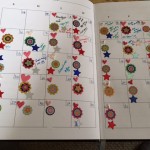
Though I have been using the Planner Pad for a while now and I like it, I generally feel bad because I do not follow the Planner Pad system. So, I love the lay out, and it keeps my information where it needs to be, but it doesn’t help me get things done like it should.
As with many other systems, the Planner Pad worked for me, until it didn’t. Some of the problem is my own lack of discipline. Some of it is that there is always one aspect of a planner that works great for me, but some other aspect that requires me to develop a personal work around. Some of it is my intense love of getting organized (searching for new planners), and my perpetual inability to stay organized. Yes, I am a bad Virgo. I love the big clean, and hate the daily maintenance.
You know where this is going, right? Of course you do.
About a month and a half ago, I ordered a new planner. Actually, it is a note book, The Spark Notebook. There are no dates printed in it, and it is built for six months at at time. New for this year, the company is doing a planner as well, but I wanted to try out the system on a shorter basis first. Before I start this little review, I should note that I paid for my notebook and am not receiving any type of compensation for this.
Part of the reason I opted to try the six month notebook as opposed to the planner is that the Spark Notebook focuses heavily on goals. In spite of all appearances to the contrary, I have never been much of a goal setter. I’ve been content to walk the paths life sets me on, because it has always seemed that when I try to make my plans too specific the universe comes along and sets me down somewhere else.
The notebook starts out yearly planning by inviting you to develop a theme for the year. Perfect for me since I started determining my word of the year. After the yearly planning pages come the monthly pages that include goal setting, a challenge, and a monthly view.
After the monthly pages comes the weekly pages. Opposite each weekly goal setting page, is a page with a writing prompt and blank space. Where you can either answer the prompt, or use the space as you need.
The next two pages are for the weekly view. (I LOVE this weekly view.)
The reason I love this weekly view is it gives me the structure I need, but also the freedom to do what I want within that space. In fact, this is the primary reason I am currently so happy with this notebook.
At the end there are also notes pages, which you can use for whatever you like.
After using this planner for a full month, I think you can tell that I like it more than just a little. I still need to work on my goal setting skills. I didn’t quite accomplish everything I’d hoped in December, mostly because I am patently terrible at working from home. I love the monthly challenge part though! I set myself three challenges this month, and then used the monthly view to track my progress.
- No coffee – round flower-style sicker
- No candy – star stickers
- Be nice to the DH – heart stickers
Okay, so I wasn’t perfect at all of them. We all have our cranky days, and I was pretty good about the candy until people started sending it for Christmas presents. Just go ahead and count those flower stickers though, yeah – you got that right.
31 days with no coffee!
Don’t worry, I didn’t go completely mad. I’ve been drinking tea, so I was getting caffeine from somewhere. My primary tea has been Twinnings Lady Grey, which has a pretty mild caffeine level. Why would I do such a thing? Partly, it was just to see if I could. Mostly though, it was about really enjoying coffee again when I got done. Yes, I am making myself a cup first thing tomorrow morning. Yes, I will be enjoying it like Ally McBeal. (Go watch that video. Sorry, for the weird sped up dialog. I couldn’t find a better version.)
The funny thing is that the no coffee this month has been the easiest challenge, though I expected it to be the hardest – even with the tea to help me. The only time I really wanted a coffee was when I would go shopping. I usually take a cup with me, or pick on up at our Target Starbucks, to sip with I wander. The other surprise is how good I felt after only a week or two. Sure, some of that was from the no candy thing too, but to be honest I did a lot of filling in with muffins, cookies, and donuts. I was still getting way too much sugar. (Can you guess one of my January challenges?). My few days of eating candy again in the last couple of weeks have left me feeling pretty lousy. Apparently, not lousy enough to stop again after one day, but still not good. I am planning to continue with that for the time being.
Without coffee though, I have felt good enough to consider a full time switch for a while, or just bringing coffee back as a weekend only affair. I am still not sure. It will depend on how I feel after that first cup.
There are still five more months of this trial to go. Who knows if I will still love it by then? If I will get better at goal setting? What kind of challenges will I set for myself? I don’t have any of those answers, but I am looking forward to finding them out.
On Roxane Gay and learning to be bad …

Bad Feminist by Roxane Gay had been lurking around my consciousness for a while – something I knew I should read, and should want to read, but couldn’t really find the energy for. On some level, I expected to see too much of myself called out in the book. I expected too much finger pointing about the ways I am not committed enough to the movement. As someone who tries her best to do the hard work, to look for the gaps in her thinking, to own and learn from her mistakes, and to make sure her feminism is intersectional and inclusive, I worried that Bad Feminism would be about the failings of White feminism, which as a a white woman always implicates me. I couldn’t face the thought of an entire book about how I’m doing it all wrong.
Then, I watched Roxane Gay’s TED talk. Then, I went home followed her on twitter, and put Bad Feminist on my Kindle to start reading. I saw myself in nearly every chapter, and not in the way I expected. Our experiences are fundamentally different, but the places of connection were so strong for me: the early resistance to feminism, the tension between the popular culture we consume and the intellectual values we hold, the commentary and critique of film, television, and current events I wished I’d written, the escape into books (Trixie Belden was my Sweet Valley High). By the time I got to “Typical First Year Professor,” I was in tears. This semester, man, I can’t even describe it, but if you really want to know what the last few months have been like read that chapter. I shot an email to Ouiser, who of course had already read the book, and her first response back was something about how that chapter made her think of me.
Don’t worry, I’m not trying to put Gay on the Feminist Pedestal she decries, nor do I mean to overwrite her stories with my own. It has, however, been far too long since I read a book that energized and moved me in the way this one did. Bad Feminist makes me think about the other aspects of myself where I feel a tension between who I am and what I think the requirements for that label are. In the introduction Gay says:
“I openly embrace the label of bad feminist. I do so because I am flawed and human. I am not terribly well versed in feminist history. I am not as well read in key feminist texts as I would like to be. I have certain … interests and personality traits and opinions that may not fall in line with mainstream feminism, but I am still a feminist. I cannot tell you how freeing it has been to accept this about myself.”
Though I hadn’t labeled it as bad feminism, I also have made peace with the differences between mainstream feminism and my own feminist thought. Now I wonder, how else might it be freeing to accept a label of bad ____ in my life. What are the other ways I attempt to define myself, yet feel inadequate when I think about the expectations of the label?
Writer.
I am a bad writer.
Though I don’t put “Writer” on my business cards, it is something that is central to what I do, and I’ve been struggling to claim it as an identity marker. I wrote a dissertation, but am mortified at the thought that anyone has read it. I write academic things, but I don’t ever send them in for publication. I supposedly write this blog, but am lucky to manage one post a month. Don’t tell anyone, but I even have the seeds of some fiction pieces floating around my computer in Scrivener files. I know the rules about writing everyday, about shitty first drafts, and about revision, but I don’t follow them consistently.
As I thought about my goals and set my theme for this year, much of my brainstorming had to do with the ways I needed to be a better writer. I need to submit that article to that journal. I need to write another article for that other journal. I need to post more frequently to this blog. I need to give those fiction seeds some attention to see what grows from them. But, what if all those things I need to do to become a better writer aren’t the goal. What if instead my goal is to embrace the way I am a bad writer? What could accepting that about myself free me from? What would it make me ready for?
Risks and Rewards

I didn’t set out for this to be a year of saying yes to everything that scares me, but I have intentionally, unintentionally, and somewhat haphazardly taken some big and small risks this year. Since I spent last week, as Dr. Brene Brown describes it using the Franklin Delano Roosevelt quotation, face down in the arena, I’ve spent this week trying to take stock, figure out what got me there, and how to get back up. Fortunately for me, the universe sent along a few reminders. 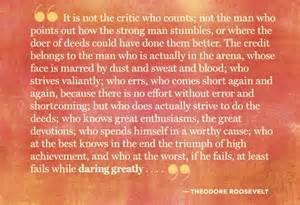
Though I find the “just get through it” mentality generally serves me well. One of the downfalls of this mentality is that sometimes I get so busy “getting through it” that the things I need to process, and actually deal with, tend to stack up.
As someone surrounded by friends and family who face daunting struggles with depression, I consider myself blessed that my own bouts of depression tend to be short-lived, and in some ways purposeful. Sometimes it takes me a while to figure it out, but generally if I am feeling depressed it is a sign that in “just getting through” stuff, I’ve also let things pile up. So, last week when I reached a particularly low point, I knew that part of the process of getting back up would have to be taking stock of things and figuring out how to deal with them.
Please, don’t run screaming, this is not going to be a post where I give you a three step process for solving all my (and/or your) problems. This post is more about identifying the things, taking risks, and their rewards. If you want to run screaming from that, well, now is the time; and, it won’t hurt my feelings if you do.
For me, getting through things often means narrowing my focus and concentrating on putting one foot in front of the other. This a great strategy for the day to day, for things like being fully back in the class room for the first time in five years, or for immersing myself in a sub-field I’ve only dabbled in before, or for re-adapting to life in a smaller, more isolated community. The problem with this narrow focus is it means that when I do stumble I lack the perspective to help me recover. Since I have always managed the day to day stuff fairly successfully, it is natural for me to be hard on myself when I start not coping well with the day to day.
It takes time for me to see the forest for the trees, to fully accept that three and a half months ago my office looked like this: 
that I said good bye to that place, the people I worked with, and my friends: 
that I packed up the DH, the dogs, and said goodbye to this town, the people, and this old house: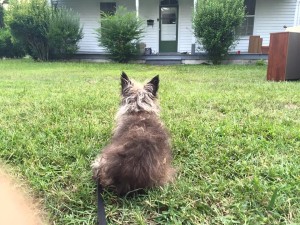 .
.
I did all of that to take a job I’d applied for in April, and interviewed at in May. A job that carries a similar title and some similar day to day work, but that in reality has vastly different expectations. Basically in about 8 months I changed nearly everything about my day to day life. Yet, my day to day, get through it, coping strategy doesn’t really account for that. Basically, it tells me, “You did this to yourself. Now, suck it up and get going.”
As my last post revealed, it is hard enough for me to admit I miss the people and community I had, I haven’t even started to think about how I miss my standing desk and dual monitor set up, the window in my office, the restaurants I could walk to for lunch. All of those things I know are affecting me physically and emotionally, yet I’m not taking the time to consider them. Really, I am actively berating myself for not dealing better. (Yeah, I know … that is some logic there.) As silly as it sounds, this week I’ve been thinking about / accepting that this move, this new job, this new life they all constitute a very big risk I have taken. Funny, it wasn’t until last week when I felt completely flat on my face that I realized I was even in the arena in a very big way.
Actually, it was a combination of feeling completely defeated, and taking smaller risks that helped me to better accept the big risk I have taken, and to be kinder to myself in this struggle. Last week, I sent a draft of an article to a colleague at another institution. It doesn’t sound like much of a risk, but this is the first time I’ve shared my work outside of my friends and graduate school co-hort. (No, the dissertation does not count, and why is a different discussion.) This colleague graduated from a more prestigious university than I did. She is insanely smart, and I feel like I work to keep up with her in conversation. Though I knew it would ultimately help me, I worried about sharing this not quite first draft with her. It felt like showing my warts. I was worried she would tear my work apart, and that she would be right in doing so. Of course, I didn’t share any of this with her, so today when I received her feedback it felt like a gift. She praised and loved parts of my article, and she gave me wonderful feedback and tips on the other parts … the parts I knew needed more attention. My reward for this risk isn’t the praise an positive feedback she gave; my reward is that she pushed in all the places I knew I needed pushing. She confirmed my own instincts about my writing. Right now, for me, this is a win, and a small risk that I hope will lead to bigger ones.
This is getting long, I know, but just one more thing. The other risk I took this week is having my faculty mentor, who is from the professional education department, observe my class. Being back in the classroom this year has left me all kinds of vulnerable, but this last couple of weeks I have really been feeling it. Listening to other people in the department talk about their composition classes, it’s become clear to me that I have a very different pedagogy, and structure my class quite differently. The most obvious way I have done that is by making my class read, think, and talk about race. (I did mention that I moved North of North, right?) Since they are all working on their own topics and projects, we needed an example to talk about in class, so I structured a series of readings focused on race in America, which started with whiteness and ended with Rachel Dolezal.
Whenever I talked about the readings and discussions our class was participating in, my colleagues would talk about how brave I was, or seem incredulous that I would bring these issues up with my class. There were conversations that were a struggle, but, for me, it all paid off as I listened to this class talk about Ta-Nehisi Coates The Case for Reparations. (Yes, they read it, and yes they owned the discussion.) The reactions of my colleagues began to have an effect though. I worried, was I forcing my view on them. I’d done my best in class not to impose my opinions, but, given my authority in the classroom, even bringing up this issue could be considered imposing it on the students. I also worried if I’d gotten too far into the readings / discussion, and neglected the writing. Last week, in a meeting before class one of the students thanked me for making them think about and talk about race. I won’t lie, that made me feel good.
Last night, when I was talking with my mentor about the class she shared two things. First, the class said they enjoyed that I was making them talk about hard issues. (The student who’d thanked me last week was absent, so this was coming spontaneously from other students in the class.) Second, the feed back she and the class gave me about where class / my teaching could improve, confirmed what I’d already been thinking. Again, that the class didn’t hate me for making them wrestle with a difficult issue, was important good feedback. More important for me though, was the confirmation that what I suspected needed work was also what they felt needed work. It was another confirmation that the risk was worth it, and of my own instincts.
Yes, I took these small risks, and in doing so I learned I am not the perfect writer or the perfect teacher. I also learned, however, to trust my own instincts about how to become better at both. I can also hope that the positive results of these smaller risks are good omens for the much bigger risk I have taken with this move. I am definitely not comfortable right now, so I guess the least I can do is be courageous.
Homesick? Friend-sick

When I was 9, my dad built a trailer to pull behind our red Malibu classic station wagon. We crammed it and the car full, leaving just enough space for my little brother’s car seat to sit in the middle of the back seat and me next to him. I don’t remember much about that move, because I slept through much of it. My strongest memory of that trip is the afternoon stop for coffee. Wherever we were I would always order the cherry pie. The end result of that trip was our eventual move to Aberdeen, Wa.
For the next thirteen years, if anyone asked me where I was from my first answer was always Minnesota. My logic was that I was born there, and all my extended family was there: my aunts and uncles, older and younger cousins. When I met my cousin for lunch the other day, she reminded me of something else. Apparently, I also used to constantly talk about moving back to Minnesota. Someday I would live here again. Though I don’t remember talking about this in particular, I don’t doubt it is true. Well, after thirty-two years, I have apparently gotten my wish.
As with most wishes this is good and bad.
Now that I am ostensibly “home.” I feel less at home, and more homesick, than I have in a long time. The gift of not having strong ties to particular physical space is that I can general make any place I am feel like home. The problem with this is that my definitions of home are often tied to particular groups of people.
So, while I don’t miss the job, the humidity, the struggles I faced, the decrepit house we lived in, I do miss my Southern friends, my Southern family. Though many of my grad school friends have moved on to their careers other places, the most important were just an hours drive away. My work friends, who I never saw enough of, the most important of whom I could have worked with again this year. My Durham friends, who I saw even less of, but who had just moved less than a mile away. Though not ideal in so many ways, my Durham life had just coalesced in important ways; yet, between May and July I blew it apart.
Certainly missing my friends isn’t the only thing making me feel less than at home in my new location, but it is probably the most obvious and least complicated.
Momentary Reprieves

When I accepted this job, the DH and I had some idea of what we were getting into. After all, we both spent some time growing up here and met at a college in southern Minnesota. Neither of us were surprised things started getting cold at the end of September; certainly, we weren’t happy about it, but we remembered enough to expect it. What we had forgotten, however, was one of the best things about fall in the North. The unexpectedly warm up. After a couple of weeks with highs barely in the 60s, grey skies, and occasional freeze warnings.
We’ve been blessed with a gorgeous, sunny, 80 degree weekend. Granted my ability to appreciate this weekend has been somewhat limited. My head really hates these kinds of sudden changes in the weather, and lets me know that with terrible headaches. Whenever the Advil kicks in, though, I have made it a point to get outside to do something. I mowed the lawn one last time, and played some catch with Bradley. Anything I could do to enjoy this reprieve from the cold, dark winter I know is coming. Yes. I said it. Winter is coming.
It wasn’t until last night, when the tightness in my neck and shoulder returned after dinner, that a different reprieve ended. I remembered: how I’d been sick at the beginning of the semester, how I’d been sneezing frequently and with a lot of force for the last week; how I have been pretty stressed about my new job; how all of those things are slightly different, but very much the same way I’d been feeling seven years ago. As those things dawned on me, I realized the date, and that for the first time I’d completely forgotten Stroke Day.
Seven years ago, on October 4th, I suffered an stroke, specifically an arterial dissection in an artery on the right side of my neck. I was just 35, so it surprised everyone from my family to the doctors, who took 13 hours to diagnose me. To this day no one really knows what caused it. Since then, I have always found a way to “celebrate” stroke day. Nothing big, so maybe commemorate is a better word than celebrate. This is the first year that Stroke Day passed completely unnoticed by me, until I started thinking about my headache that is.
I was just 35, so it surprised everyone from my family to the doctors, who took 13 hours to diagnose me. To this day no one really knows what caused it. Since then, I have always found a way to “celebrate” stroke day. Nothing big, so maybe commemorate is a better word than celebrate. This is the first year that Stroke Day passed completely unnoticed by me, until I started thinking about my headache that is.
That I could forget Stroke Day this year is remarkable, since a good friend of mine, who suffered a brain aneurysm has spent the month blogging about her story and preparing for a fundraising 5k. I have, for reasons you can probably imagine, avoided reading Niki’s story. Seeing her posts promoted on Facebook and her race photos, however, probably should have put Stroke Day on my radar. Once I remembered however, I had to work pretty hard not to worry excessively about my headache.
Having a stroke, learning to walk again, writing and teaching again for the first time, those are things that you don’t really forget. More importantly, they are things your friends and family do not easily forget. One thing I have always maintained is that my friends and family were much more deeply scarred by my stroke than I was. I couldn’t see myself getting a spinal tap in the ER; in and out of consciousness in intensive care. The doctors weren’t tell me all the worst case scenarios possible: I would never wake up, never walk, never be the same. When I finally “woke up,” and began my recovery, I felt normal. Yes, I had obstacles and things to do, but I dealt with them the same way I do everything, I just did it. (One foot in front of the other, remember.) I couldn’t see the differences in my personality, in the way I moved. One result of this has been that I am typically able to worry much less about my health. Maybe a better way to describe it is that I am able to treat my health much more normally than my friends and family. For me a cough is just a cough, and a pain is just a pain.
For a long time, every sneeze, cough, or mention of pain meant the DH would ask, “Are you okay?” in a particular tone, then hover over me until I was back to normal. Intellectually, I understood his concern; emotionally, it was stifling and felt like I could never fully recover until everyone would start treating me normally. For the longest time, I just refused to talk about my health. If I had a headache, I took some Advil and Tylenol and did my best not to mention it. My reprieve, my ability to forget stroke day, and then my realization in conjunction with my headache, actually helped me to understand the DH’s worry a little better. I knew my headache was just a headache, but once memories of the stroke began it was almost impossible to get them to stop.
My friend Niki, who made it through her brain aneurysm, talks a lot about celebrating her “Life Day,” the day she had her successful operation. I think she like, a lot of people, sees my insistence on remembering Stroke Day as somewhat morbid and negative. I don’t see it that way at all. Remembering Stroke Day, or this year forgetting it, for me is about recognizing my own vulnerability, recognizing my ability to get up and keep going, and recognizing the strength of everyone who went through that experience with me. 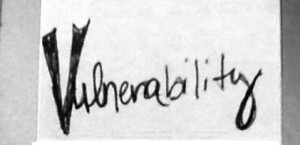
One foot in front of the other
Well, that didn’t take long.
I have been at my new job for just over a month, and already I feel a little like I am struggling to keep up, and swimming in self-doubt. Intellectually, I know that is just a function of the new job territory. As usual, though, knowing it doesn’t necessarily make it any easier to live through.
Moshe usually does a pretty good job of helping me live through it. He is generally pretty attentive to our moods, and is a wonderful snuggler.
My to-do list, which I know is currently no more than it was at my last job, feels overwhelming. Consequently, I have spent the last week beating up myself up for not getting enough done, while I find ways to keep myself from doing the things that would make me feel like I had accomplished something. Yes, feeling overwhelmed makes me less productive instead of more productive. We all have our silly ways of making ourselves miserable, and this is mine.
Typically, this is about the time in every semester, when I go through something like this. This time just feels bigger than normal, because I am also feeling the pressure to prove myself at my new job, to adapt to life in a new region, a much smaller town, and to support the DH as he tries to do the same and look for a new job. Do I have a conclusion for all this? Not really, the only thing I know to do is what I do all the time. Just get through it.
I know this is something that many people go through when they take a new academic job. I would guess also that people working other places go through it too. There is always a point in the first year when the reality of a new job starts to wear away the shine on the possibilities of the new job, and that is why I wish I could say, “I did these five things, and it helped me through this funk.” The reality though is that I don’t have anything better than I just get through it because I have to. Sure, I have tactics to help me get back on track, but mostly they just involve tricking myself, and faking it until I make it.
The primary way I trick myself is by abandoning my To-Do list in favor of recording things on my Emergent Task Planner. It helps me focus on what I got done instead of what I thought I should get done. Usually, this tactic allows me to feel a little less overwhelmed, which helps me ease back into a productivity that I am comfortable with.








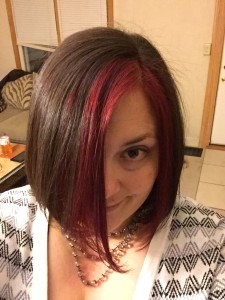
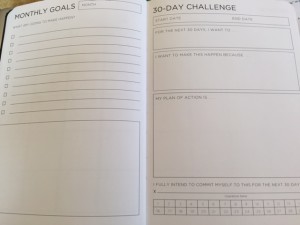
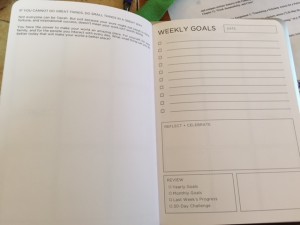
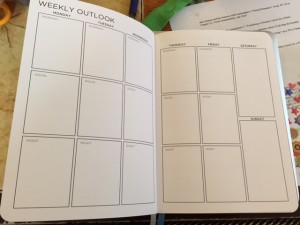
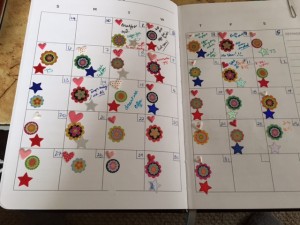
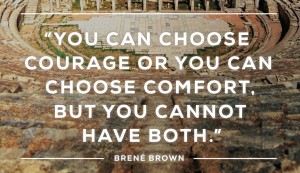



 D5 Creation
D5 Creation